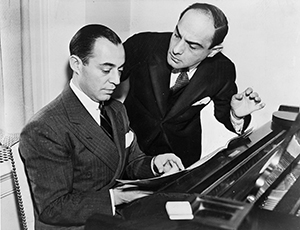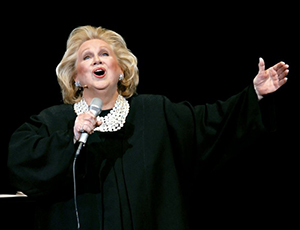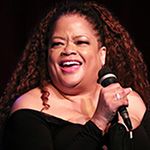Deborah Grace Winer
The Classic American Songbook Series
March 22, 2018
By Elizabeth Ahlfors for Cabaret Scenes

One of our top American lyricists, E. Y. (“Yip”) Harburg wrote very simply, “Words make you think a thought. Music makes you feel a feeling. A song makes you feel a thought.”
Those words are one way to define the Great American Songbook, songs written in the period between 1920 and 1970 that have been appreciated around the world and through the decades. They reflected the American mind and heart, giving voice to our ideals, dreams and behaviors and the best of them, artistic and meaningful with wit and flavor, have lived on through different eras, becoming “standards,” as fresh today as they were when they were written.
Dedicated to keeping this tradition alive and treasured, author, dramatist, and producer Deborah Grace Winer’s life and career has centered around music and songs and she is enthusiastic about creating a new series, The Classic American Songbook at Feinstein’s/54 Below. “I am overjoyed to present these smart little jewel box revues in this totally cool, totally hip supper club room. It’s an absolutely ideal setting for The Classic American Songbook series. I love the intimacy of this kind of setting. You’re on a stage but, yet, you’re not. You’re part of informality and sharing the human experience together. I really believe that it all goes back to when we sat around a fire and listened to a story.’”
Having recently stepped down after nine seasons as Artistic Director of the 92Y’s Lyrics & Lyricists where she originated 50 shows, she is adept at juggling lots of different parts. When invited to produce the new series at Feinstein’s/54 Below, Winer’s reply was a quick “Yes.” She loves musical revues, calling them “theatrical and completely musical at the same time. It’s very different from going to a musical… There are many colors in the palate and I love working with this material in all the forms and with different artists and collaborators.”
Coming from a musical background in Manhattan and Westport, Connecticut, Deborah Grace Winer grew up in the midst of artistic and theater personalities and never thought of a different career. She worked summers at Lucille Lortel’s Westport Country Playhouse, and joked, “My definition of summer stock from growing up was Betsy Palmer who nobody in my generation ever heard of.”
Her own theater and musical outlet was writing. She published The Night and the Music: Rosemary Clooney, Barbara Cook and Julie Wilson Inside the World of Cabaret and On the Sunny Side of the Street: The Life and Lyrics of Dorothy Fields. She co-authored two works with Dennis McGovern—Sing Out Louise!: 150 Stars of the Musical Theatre Remember 50 Years on Broadway and I Remember Too Much: 89 Opera Stars Speak Candidly of Their Work, Their Lives and Their Colleagues. She also wrote a play, The Last Girl Singer, and her articles on music have appeared in numerous publications. She was featured on PBS and NPR’s songbook specials and has developed shows in numerous venues.
Winer, an energetic, sophisticated New Yorker, said recently, “The whole idea is to make the songs fun, irreverent and fresh, very focused, little 70-75 minute revues.” Each of the shows will be scheduled at 54 Below for two shows, 7 pm and 9:30 pm and they are here one night only. “You miss it and it’s gone.” But the shows, each one set and organized, will still be flexible enough, so keep an eye out for when it’s booked again, ready, set, and going to another club at another time.
A January preview show at 54 Below — Baby, Dream Your Dream— saluted Dorothy Fields and the women of the American Songbook. “We learned how to make this format work in this room. You ask yourself, ‘What feels right?.’ You’ve got these festive people, you want to be breezy and fun so they can get on their way.”

The series launches on March 27 with a celebration of Richard Rodgers and Lorenz Hart: You Took Advantage of Me: Rodgers and Hart on Love. Hart’s title lyric is an example of his conversational phrasing, self-deprecation and wit, offering a clue to the lineup of smart, sexy songs still relevant today. “They were jazz age writers and some of these songs are among the most famous standards that are now part of our DNA. The women they portrayed were very sexually assertive, very ironic and contemporary. These songs are very much like human beings today. They could have been written yesterday. I’ve learned there is something very layered about these songs. We’re using them as they were written,” as opposed to versions that have been commercially cleaned up. An example she gives is the original version of “Bewitched, Bothered and Bewildered,” referring to the original lyrics that once were found too suggestive and were changed by various artists.
She mentioned, “I’ve been blessed to have Robert Kimball and other great mentors in my career. As he wrote, Larry Hart, Richard Rodgers, and Herb Fields were all friends at Columbia together, an upper-middle class Jewish group. Dorothy Fields was Herb’s little sister and hung around with them and she became very influenced by the lyrics of Hart, going on to mix in her own songs a similar sophistication, beautiful poeticism, and studied casualness.” In turn, Carolyn Leigh in the 1950s found her influence was Dorothy Fields and, therefore, Hart. Leigh identified with Hart’s troubled life. “Hart was truly a sad person, an alcoholic wrestling with his homosexuality, and Carolyn was very unhappy and wrestled with her weight, so there was a direct line from Hart to Fields to Leigh.”
Winer, as creator, writer and host of the series, has chosen to pack her revues with some of the star talents from Broadway, cabaret, and jazz. “What we wanted was to cast the show with not just talented people, but people who would bring something different to the songs.” The opening show features Debby Boone, Darius de Haas, and Christiane Noll, all distinct from each other and all very versatile. Director is Mark Waldrop, with pianist/music director John Oddo leading a trio including Jay Leonhart on bass and Jim Saporito on drums.

The second show in the series will be A Jerome Robbins Centennial Concert, featuring guest creator and director Kathleen Marshall on May 8. This will be a celebration of some of Broadway’s favorite musical scores and how they were shaped by Robbins, a legendary director/choreographer. A selection of Broadway’s best entertainers will perform some of Broadway’s stellar songs from landmark musicals.

The third show, on June 17, is Till There Was You: A Celebration of Barbara Cook; Winer, who was a friend of Cook’s, calls it “a big old party for Barbara.” With Winer as creator, writer and host and Mark Waldrop directing, you can expect Christine Andreas, Kate Baldwin, Rebecca Luker, Christiane Noll, Linda Purl, Karen Ziemba, and that’s just the beginning.
For Deborah Grace Winer, it’s all fun, and the point is to have fun with the audience that she loves and respects. She remembers once, after a gig, asking jazz guitarist Bucky Pizzarelli if he had fun that night. His reply, “After all these years, I’ve learned one thing: If it ain’t fun, we should all go home.”
She laughs. “And isn’t that a quote we should all live by?”





